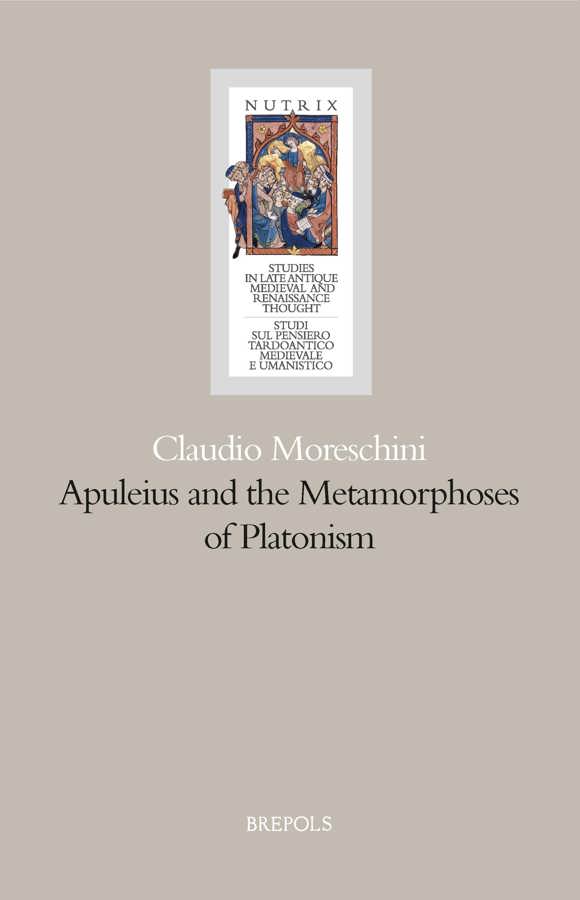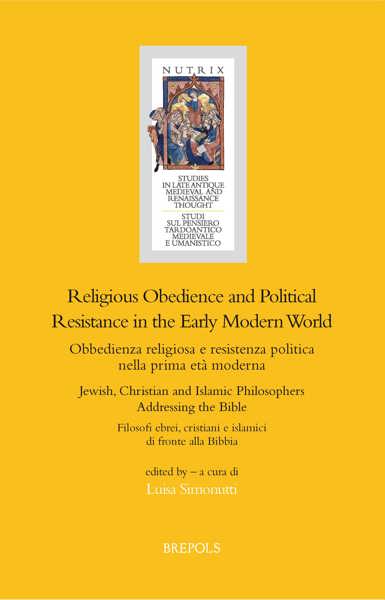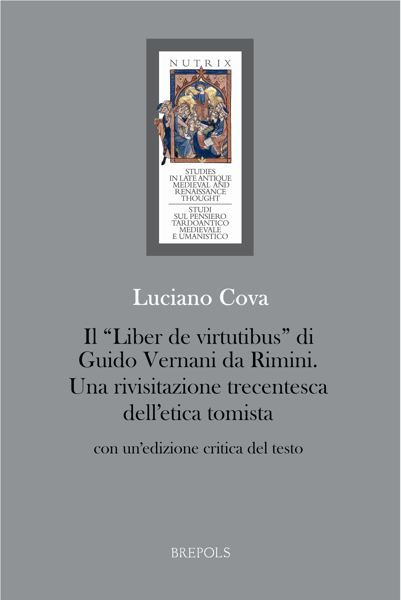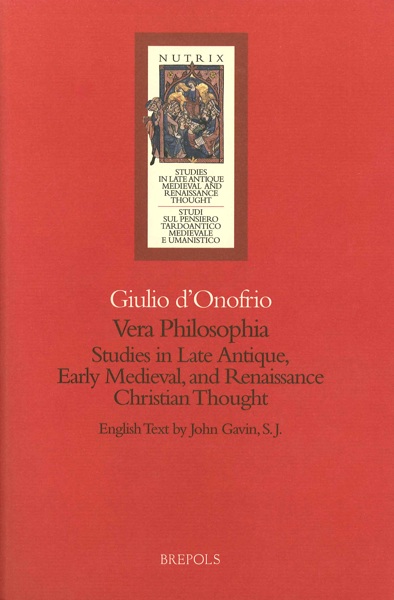
Apuleius and the Metamorphoses of Platonism
Claudio Moreschini
- Pages: 420 p.
- Size:160 x 240 mm
- Illustrations:1 col.
- Language(s):English
- Publication Year:2016
- € 130,00 EXCL. VAT RETAIL PRICE
- ISBN: 978-2-503-55470-9
- Paperback
- Available
- € 130,00 EXCL. VAT RETAIL PRICE
- ISBN: 978-2-503-56655-9
- E-book
- Available
“Once again he offers the reader an outstanding and very erudite monograph on Apuleius’ thought, with focus on his interaction with the philosophical and literary context contemporary to him, and on his sources.” (Anna Marmodoro & Vito Limone, in Bryn Mawr Classical Review, 2016.10.33)
“Tra i molti meriti di Claudio Moreschini c’è quello di aver capito da sempre l’importanza di Apuleio anche sotto il profilo filosofico, e di avergli dedicato, conseguentemente, una buona parte della sua attività scientifica (…) Il nuovo libro uscito presso Brepols si presenta quindi come il coronamento di parecchi lustri di lavoro rigorosissimo sui testi (…) Avvalendosi di una ricchissima conoscenza della letteratura secondaria, Moreschini espone sinteticamente, ma senza tralasciare nulla di essenziale, lo status quaestionis.” (Luciano Albanese, in Syzetesis, 3/2, 2016, p. 232-233)
“Moreschinis zweites Apuleius-Buch ist vor allem eine machtvolle Einrede gegen neuere Darstellungen des Apuleius, die ihn auf den Rhetor und Sophisten verengen wollen (…). Der Literaturwissenschaftler sollte diese vehemente gelehrte Stimme bei seiner Lektüre im Kopf behalten, während der an Apuleius interessierte Philosophiehistoriker neben den bisherigen Standardwerken zum Mittelplatonismus (…) nun auch eine umfassende Darstellung von Apuleius’ Philosophie zur Hand hat, die eben auch die literarischen Werke mitbehandelt. Und auch jedem allgemein an der literarisch-philosophischen Kultur des 2. Jh.s n. Chr. Interessierten sei dieses Buch als Fundgrube bedenkenswerter Einsichten und Anregung für die eigene Arbeit empfohlen.” (Michael Schramm, in Latomus, 76/4, 2017, p. 1137)
“This study is an admirable guide for the careful reader through the complexities of Middle Platonism. It invites readers of Apuleius to detect philosophy and rhetoric in all Apuleius writings, exhorting us not to use a strict ‘sources’ method to seek out Apuleius philosophy because it is in Apuleius’ audiences that his Platonism will be found.” (Ilan Peled, in Anzeiger für die Altertumswissenschaft, 3/4, 2016, p. 241)
“This study shows, once again, that M. knows Apuleius as few others do. His impressive familiarity with the scholarly literature is illustrated both in the many learned footnotes and in his frequent discussions of the views of other scholars. Those readers who lack prior knowledge of the philosopher Apuleius may occasionally encounter a few difficulties in grasping all the technical details of his position (even more so as the quotations from his works are left untranslated), but they are never abandoned by M., who remains a reliable guide. His arguments are always clear, lucid and well-considered, and the many illustrative parallels with other authors make this book not merely a penetrating study of Apuleius’ Platonic philosophy but also of the general intellectual climate in Apuleius’ time. The book is well written, in a fluent and elegant style, and as such succeeds no less in docere than in delectare – a combination that Apuleius himself would no doubt have appreciated very much. In short, this is an excellent book on Apuleius written by an Apuleius rediuiuus.” (Geert Roskam, in The Classical Review, 67, 2017, p. 422)
“This is a mighty book, and greatly to be welcomed. Claudio Moreschini has been for many years concerned to do justice to the achievements of Apuleius (…) The present work is in the nature of a definitive summing-up of his position—though we hope it will not be his last word! (…) All in all (…) this is a work to be treasured.” (John M. Dillon, in the International Journal of Platonic Tradition, 12/2, 2018, p. 190-192)
“Overall, this monograph is an erudite, rich and enlightening overview of Apuleius’ work and his position in the context of the Second Sophistic and Middle Platonism (…) The book offers a truly comprehensive account of Apuleius and his works (…)” (Eleni Kechagia-Ovseiko, in the Journal of Roman Studies, 109, 2019, p. 417)
This book presents a thorough re-examination of Apuleius’ Platonic philosophy, encompassing both his philosophical and literary works. Its primary concern lies in demonstrating how there is no significant gap between the Platonic philosophy of the Opuscula (De deo Socratis, De Platone et eius dogmate, De mundo) and the literary tastes of his rhetorical and most important output, such as the Apologia, the Florida, and foremost the Metamorphoses. Apuleius’ Middle-Platonism did not limit itself to technical works, but also influenced his literary interests.
Up to now, Apuleius’ Platonism has been very poorly investigated. It had attracted the attention of only a few – although prominent – scholars (Festugière, Dodds, Theiler), before being taken briefly into consideration in the monographs by John Dillon (The Middleplatonists, London 1977) and Stephen Gersh (Middle Platonism and Neoplatonism. The Latin Tradition, Notre Dame 1986). Because of his multifaceted interests and brilliant style, which is reflected in his conferences, judicial orations and in the novel, Apuleius was mainly treated as a sophist. In the wake of a recent revival of interest in Greek Middle Platonism and in its predecessors (such as Philo of Alexandria or Plutarch), the rhetor of Madauros is worthy of a new examination. This book aims at considering Apuleius as a Philosophus Platonicus who, at the same time, is a Latin Sophist, showing how the two aspects are closely intertwined.
Examining only one aspect would be easy, but would not do justice to Apuleius’ personality. In particular, it is necessary to insert him into a philosophical line, which runs from the first to the third century AD, thus outlining the specifics of Latin Platonism. On the other hand, it is necessary to take into account the concerns of the Second Sophistic in philosophy, though in a somewhat trivialized and less systematic way. The title of the book (Apuleius and the Metamorphoses of Platonism) indeed underlines how Apuleius’ chameleonic Platonism ‘transforms’ itself, both in his philosophical and his literary works. While challenging the current scholarly trend that overrates the philosophical presence in the Metamorphoses, this book suggests new outlooks, as well as providing a new perspective on many hypotheses previously considered as a given. In order to do this, it investigates the literary, religious and philosophical, Graeco-Roman / African milieu in which Apuleius lived from a literary, religious and philosophical point of view, while considering his influence on authors from Late Antiquity.
PREFACE
INTRODUCTION. APULEIUS PHILOSOPHER AND RHETOR
1. Apuleius and Middle Platonism
2. Apuleius the Philosopher and Man of Letters
CHAPTER 1. POPULAR PHILOSOPHY AND PLATONISM: THE APOLOGIA AND THE FLORIDA
1. The Defence of Philosophy and Philosophers
2. Philosophers and Poets
3. Praise of Poverty
4. Scientific Research
5. Magic
6. Mystery Religions
7. Platonism
8. Platonism and Sophistic
CHAPTER 2. THE METAMORPHOSES, THE NOVEL OF A PLATONIC PHILOSOPHER
1. Some Observations on Criticism of the Metamorphoses
2. The Novel and Religion
3. The Platonism of the Metamorphoses
4. Platonism and the Isiac Mysteries
5. The Metamorphoses: an Autobiographic Work?
CHAPTER 3. THE TALE OF CUPID AND PSYCHE
1. Symbolic Interpretation
2. Folkloric Interpretation
3. Religious Interpretation
4. Literary Interpretation
5. Attempts of Reconciliation
6. The Moral Interpretation
7. The Platonic Interpretation
8. Platonism in the Tale
CHAPTER 4. THE DE DEO SOCRATIS AND APULEIUS’ DEMONOLOGY
1. The World and Living Beings
2. Middle Platonic Demonology
3. The Nature of the Demons
4. The Roles of the Demons
5. Demon or Soul?
6. A Difficulty in Apuleius
7. The Language of Demons
8. Apuleius and Plutarch
CHAPTER 5. RHETORIC AND PHILOSOPHY IN APULEIUS’ TIME
1. Fronto
2. Fronto and Marcus Aurelius
3. Favorinus in Rome
4. Aulus Gellius
5. Gellius and Calvisius Taurus
6. The Speculum morale of Gellius
7. Cynicism
8. Aelianus
9. Minor Platonists of the Roman World
10. Aelius Aristides and the Platonism of the Second Century
CHAPTER 6. THE PHILOSOPHICAL WORKS
1. The De Platone et eius dogmate
2. The De mundo
3. Chronology of the Philosophical Works
4. The Authenticity of the De Platone and the De mundo
5. The De interpretatione
CHAPTER 7. APULEIUS "PHILOSOPHUS PLATONICUS". PHYSICS
1. The Doctrine of God
2. Matter
3. The Ideas
4. The Cosmic Soul and Cosmogony
5. The Creation of the World
6. Providence and Fate
7. Time
8. The Human Soul
9. Some Physical Questions
CHAPTER 8. APULEIUS "PHILOSOPHUS PLATONICUS". ETHICS
1. First and Second Goods
2. Man and Oikeiosis
3. The medietas of Virtue
4. Virtues and Vices
5. Goods and Evils
6. Rhetoric
7. Varia Moralia
8. The Perfect Sage
9. Likeness to God
10. Following God
CHAPTER 9. APULEIUS AND CHRISTIAN AUTHORS
1. Apuleius and Arnobius
2. Cornelius Labeo
3. Augustine’s Polemic against Apuleius
CONCLUSION – BIBLIOGRAPHY – INDEX OF NAMES




